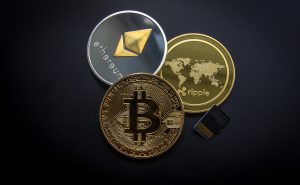A cryptocurrency exchange is essentially a stage for coordinating purchasers and merchants. They work similarly as trading for different resources, for example, stocks. Individuals will, in general, call them traders since they frequently purchase and undercut in time allotments. Generally, investors are the individuals who hold their speculations for more. Bitcoin exchanges are perfect for those with a lot of trading experience.
Currency exchanges usually tend to charge a small fee, known as a volume-based fee. Depositing unacceptable currencies at currency exchange offices may result in currency conversion fees. Exchange is different from the wallet. The wallet is the place where you store your purchased cryptocurrencies digitally. Some platforms provide both; others do not. This means that traders need to transfer cryptocurrencies to other locations. Not all exchanges are made equivalent. As the Bitcoin official site clarifies, they give a different level of security, security and protection, and control assets and data.
Categories of Exchange
Trading platform:
A platform that interconnects buyers and sellers.
Broker:
A platform that sells cryptocurrencies at a price set by the broker. These function similarly to service providers dealing with Forex.
Direct Trading:
A platform that provides direct peer-to-peer trading. This allows users to exchange currencies around the world and allows sellers and buyers to set prices.
Buyers and sellers
To make a buy, the purchaser should initially store assets into a cash exchange account. They may utilize nearby money or another cryptocurrency. Most exchanges acknowledge bank moves or charge/Visas. Some acknowledge administrations like PayPal. Next, put in a purchase request on the exchange, mentioning the acquisition of bitcoin beneath the most extreme cost. For example, one BTC may be less than $ 10,000. The vender puts an offer request and offers to sell a specific measure of bitcoin over the base cost. This expands liquidity. In other words, more cryptocurrencies can be purchased on the exchange. At the point when somebody submits a purchase or sell request, the exchange adds it to the request book. The request book is a rundown of the sums that bitcoin traders need to sell and the costs they are searching for. The exchange goes about as a matchmaking administration between the two. For instance, a dealer might need to sell 1 BTC for more than $ 10,000. Exchanges will coordinate them with purchasers hoping to go through them a ton, and cash will change hands.
Exchanges and Wallets
If the whole section above gets confused, don’t worry. Uses both exchanges and cryptocurrency wallets to guide you through the entire process of buying, selling, and trading cryptocurrencies. If you want to invest fiat currencies (such as US dollars) in crypto sets, you need to set up an online account. Currently, Coinbase is one of the most popular and safest methods. In the coin base, you can purchase and hold the most popular and convenient cryptocurrencies, mainly Bitcoin and Ethereum. I’ll explain why these two are so useful later.
After setting up this wallet, you can use the wallet address to receive coins and send coins to other wallets. If your wallet doesn’t allow you to buy or sell these cryptographic types of cash, you should set up a cryptocurrency exchange account on a phase. In the wake of setting up a record with a cryptocurrency exchange, you have to send coins to this record to begin exchanging. You should send Bitcoin or Ethereum (or any exchange utilized by Crypto Exchange) from the Crypto Wallet to the relating digital money address on your exchanging account. Be that as it may, on the off chance that you need to pull back these coins to make a profit, the procedure is very precarious. This is on the grounds that the location or wallet that gives both altcoins both capacity and a lawful portal the way toward trading global fiat cash for cryptocurrency has not yet been distributed. In this way, these altcoins should be exchanged for fundamental coins, for example, Ethereum.
Next, send these basic coins from the cryptocurrency exchange record to the area of your wallet, and thereafter pull back these coins. Such a procedure may have an extra layer of legitimate unpredictability. A few nations, for example, the United States, treat cryptographic forms of money as resources subject to capital increases charge. Others make purchasing and selling such digital forms of money totally unlawful.
Things to Consider when you Exchange cryptocurrency
It is important to do a little homework before you start trading. Here are some things to check before making your first transaction.
Reputation
The best way to know about an exchange is to search for reviews from individual users and websites of well-known industries.
Fees
Most exchanges require you to post fee-related information on your website. Before you join, make sure you understand your deposit, transaction, and withdrawal fees. Expenses can shift altogether, relying upon the exchange utilized.
Payment Methods
If the exchange has limited payment options, it may not be convenient to use it. Please note that purchasing cryptocurrencies with a credit card always require identity verification, increases the risk of fraud, increases transaction and processing fees, and is associated with premium prices. Purchasing cryptocurrencies by wire transfer can take a significant amount of time, as processing at a bank takes time.
Verification Requirements
Most of the US and UK bitcoin trading platforms require some form of identity verification to make deposits and withdrawals. Some exchanges allow you to remain anonymous. Verification can take a few days, but while it may seem painful, it protects the exchange from all sorts of fraud and money laundering.
Geographic Restrictions
Certain user features provided by the exchange can only be accessed from certain countries. Make sure that the participating exchanges have full access to all platform tools and features in your current country of residence.
Exchange rates
Exchange rates depend on exchange rates. You will be astounded by the amount you can spare by shopping. It isn’t unprecedented for rates to vacillate by up to 10%.
Secure Exchange
While there is no guarantee that it won’t cost you another high-profile hack, choosing a reliable and secure exchange will greatly reduce your chances. The best and most reliable platforms are open about the level of security they offer and provide a wealth of tools to protect your account. Below are the most common security practices to look for when choosing an exchange.
HTTPS
Secure exchanges have a valid HTTPS certificate. Browsers automatically confirm this by displaying a lock in the address bar. HTTPS is an encrypted version of the HTTP protocol. Captures data sent to the webserver and prevents changes.
Secure password
With a proper exchange, a weak password cannot be set. A secure password requires that you use a combination of normal letters and capital letters, symbols, and numbers. This prevents anyone from forcing it.
Two-factor authentication (2FA)
It is important to protect your account with 2FA. Most exchanges offer multiple 2FA methods, including software, SMS, and hardware devices. If you do not have the option to protect your account with 2FA, the platform is not very secure. Also, the weakest form of 2FA is SMS authentication, as hackers can fake your phone number. If more secure options are available, always avoid them. The most common way is to set up two-factor authentication via Google Authenticator. A simple yet secure and effective approach.
Other notes
Exchange employs many other security tools, including multi-signatures, suspicious behavior alerts, email encryption, and phishing protection. The extra security measures certainly do no harm. As long as properly implemented, the exchange of cryptocurrencies is a very secure temporary storage.
Fund insurance
Most platforms are not obliged to comply with FDIC reporting regulations or securities investor protection procedures, as cryptocurrencies are still highly regulated. Nevertheless, some exchanges take special precautions and guarantee their funds from theft. While this is a good marketing point, most of these insurance policies do not protect personal accounts and apply only to redemption as a whole.
Coinbase
Upheld by confided in investors and utilized by a great many clients around the world, Coinbase is one of the world’s generally famous and notable agents and exchanging stages. The Coinbase platform facilitates the secure purchase, use, storage, and trading of digital currencies. Customers can purchase Bitcoin, from Coinbase through electronic wallets open on phones, or through exchanges with various customers of its Global Digital Asset Exchange (GDAX) reinforcement. GDAX is currently operated in the United States, Europe, United Kingdom, Canada, Australia, and Singapore. GDAX does not currently charge remittance fees for transferring funds between Coinbase and GDAX accounts. However, at the moment, the choice of currencies that can be traded depends on your country of residence.
Pros:
- High Reputation
- Efficient Security
- It has Reasonable rates.
- Easy to use and beginner-friendly
- Saved currencies are covered by coin-based insurance.
Cons:
- Average customer support
- It has limited payment methods
- Provides limited supported countries
- uneven service deployment worldwide
- GDAX is only suitable for technical traders.
If Coinbase sounds like a good place for you, I would reccomend them since pro.coinbase.com is my primary exchange. Freel free to use This link to join for $10 worth of crypto after trading $100 dollars or more. Join Coinbase
Bitsquare
Bitsquare is extending its market as a genuinely decentralized shared exchange that is promptly open and doesn’t require enrollment or dependence on focal specialists. Bitsquare does not hold any user funds and does not exchange personal data except for trading partners. The stage gives unrivaled security multi-sig addresses, security stores, and a judge framework represented considerable authority for the situation of exchange debates. If you want anonymity and no one trusts, Bitsquare is the best platform.
Pros:
- Reputable
- Secure and private
- A huge number of cryptocurrencies available
- No signup
- Decent rates
- Open-source
- Available worldwide
- Suitable for advanced traders.
Cons:
- Restricted payment possibilities
- Difficult for a new user.
Bitstamp
Bitstamp is a European coin-based Bitcoin showcase established in 2011. The stage is one of the original bitcoin exchanges that has constructed a dedicated client base. Bit Stamp is notable and trusted all through the Bitcoin people group as a safe stage. It offers propelled security highlights, for example, two-factor verification, multi-sig wallet innovation, and completely ensured cold stockpiling. Bitstamp has all day, everyday support, and a multilingual UI, making it generally simple to begin. After opening a free account and depositing, you can start trading immediately.
Pros:
- High reputation
- High level of security
- Global availability
- low transaction fees
- Suitable for large transactions
Cons:
- Not for beginners
- limited payment methods
- No high deposit fees
- No user interface
Conclusion:
Choosing the right cryptocurrency exchange platform for your specific needs can be a difficult and time-consuming process. Note that you are not restricted from utilizing one cryptocurrency exchange. We hope the information provided will help you determine how to exchange cryptocurrencies and which exchange platform to use.




